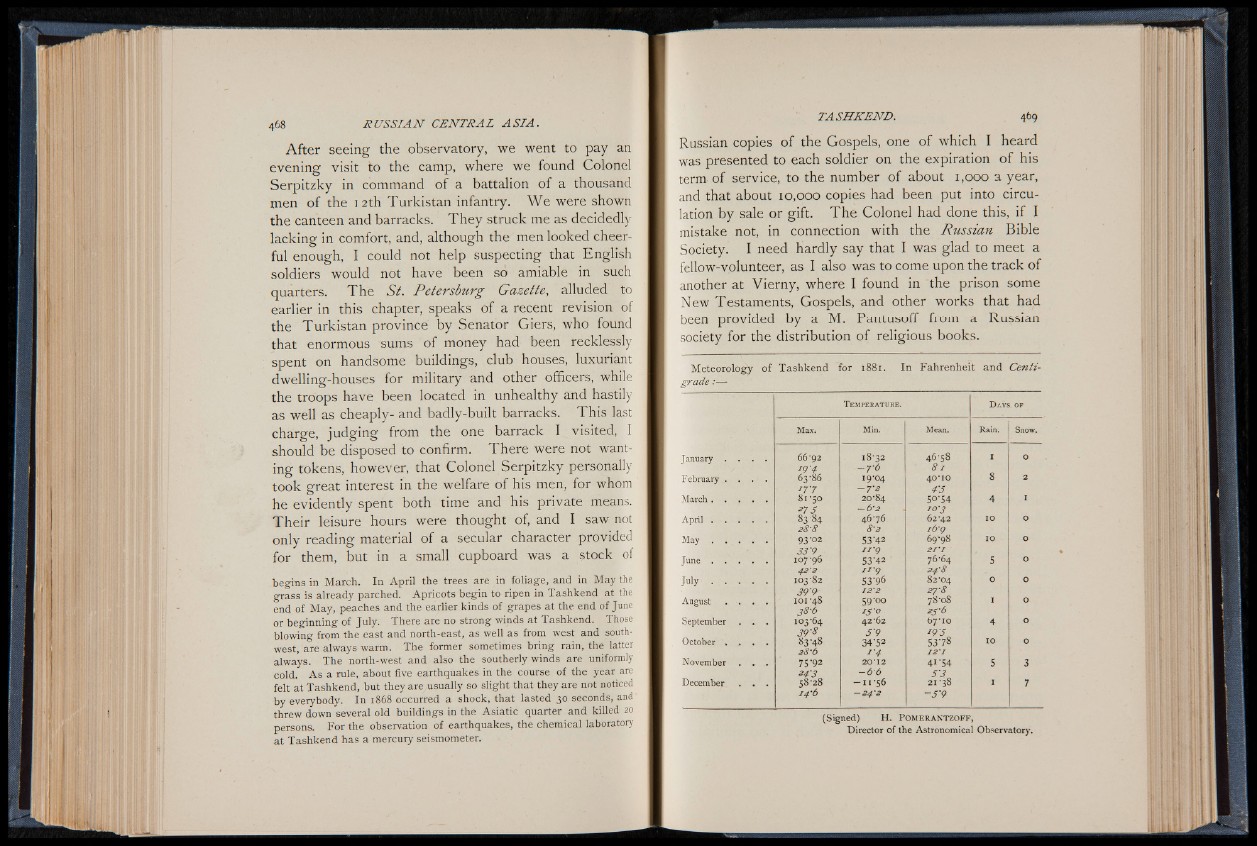
After seeing the observatory, we went to pay an
evening visit to the camp, where we found Colonel
Serpitzky in command of a battalion of a thousand
men of the 12th Turkistan infantry. We were shown
the canteen and barracks. They struck me as decidedly
lacking in comfort, and, although the men looked cheerful
enough, I could not help suspecting that English
soldiers would not have been so amiable in such
quarters. The St. Petersburg Gazette, alluded to
earlier in this chapter, speaks of a recent revision of
the Turkistan province by Senator Giers, who found
that enormous sums of money had been recklessly
spent on handsome buildings, club houses, luxuriant
dwelling-houses for military and other officers, while
the troops have been located in unhealthy and hastily
as well as cheaply- and badly-built barracks. This last
charge, judging from the one barrack I visited, I
should be disposed to confirm. There were not wanting
tokens, however, that Colonel Serpitzky personally
took great interest in the welfare of his men, for whom
he evidently spent both time and his private means.
Their leisure hours were thought of, and I saw not
only reading material of a secular character provided
for them, but in a small cupboard was a stock of
begins in March. In April the trees are in foliage, and in May the
grass is already parched. Apricots begin to ripen in Tashkend at the
end of May, peaches and the earlier kinds of grapes at the end of June
or beginning of July. There are no strong winds at Tashkend. Those
blowing from the east and north-east, as well as from west and southwest,
are always warm. The former sometimes bring rain, the latter
always. The north-west and also the southerly winds are uniformly
cold. A s a rule, about five earthquakes in the course of the year are
felt at Tashkend, but they are usually so slight that they are not noticed
by everybody. In 1868 occurred a shock, that lasted 30 seconds, and
threw down several old buildings in the Asiatic quarter and killed 20
persons. For the observation of earthquakes, the chemical laboratory
at Tashkend has a mercury seismometer.
T A SH K EN D . 469
Russian copies of the Gospels, one of which I heard
was presented to each soldier on the expiration of his
j term of service, to the number of about 1,000 a year,
! and that about 10,000 copies had been put into circulation
by sale or gift. The Colonel had done this, if I
mistake not, in connection with the Russian Bible
Society. I need hardly say that I was glad to meet a
fellow-volunteer, as I also was to come upon the track of
another at Vierny, where I found in the prison some
New Testaments, Gospels, and other works that had
been provided by a M. Pantusoff from a Russian
society for the distribution of religious books.
Meteorology of Tashkend for 1881. In Fahrenheit and Centi-
grade .‘-IB S
Temperature. Days, of
Maxi Min. Mean. Rain. Snow.
January . . . . 66'92 18-32 46-58 I 0
*94 \-I—7'6 81
February . . . . 63-86 19-04 40-10 8 2
777 i g - 7'* 4'5
March................ 81-50 20*84 5°'54 4 I
275 —6’ 2 103
April . . i • . 83 84 46-76 62-42 10 O
28-8 8-2 i6’ç
May . . . . ... 93-02 53 "42 69-98 10 O
33 V 11 9 2I'I
June , . . . . 107 -96 53’42 76-64 5 O
42'2 119 24'8
July . . . . . . 103-82 5 3‘96 82-04 0 O
39'T 12'2 27-8
August . . . . 101 '48 59-00 78-08 i O
38V *30 256
September . . . 103-64 42-62 67-10 4 O
39'8 59 *95
October , .. . . 83-48 34'52 5378 10 O
28'6 *4 12'I
November . . . IS'92 2 0 '1 2 41'54 5 3
24’3 • ¿ - - 6 Ó 5'3
December . . . 58-28 - 11 56 21-38 i 7 14'6 — 24' 2 - 5'9
(Signed) H. P o m e r a n t z o f f ,
Director of the Astronomical Observatory.